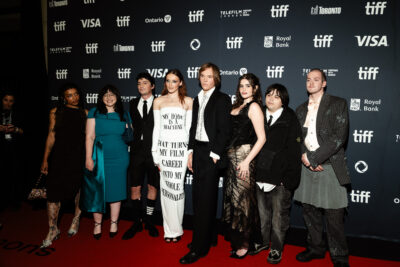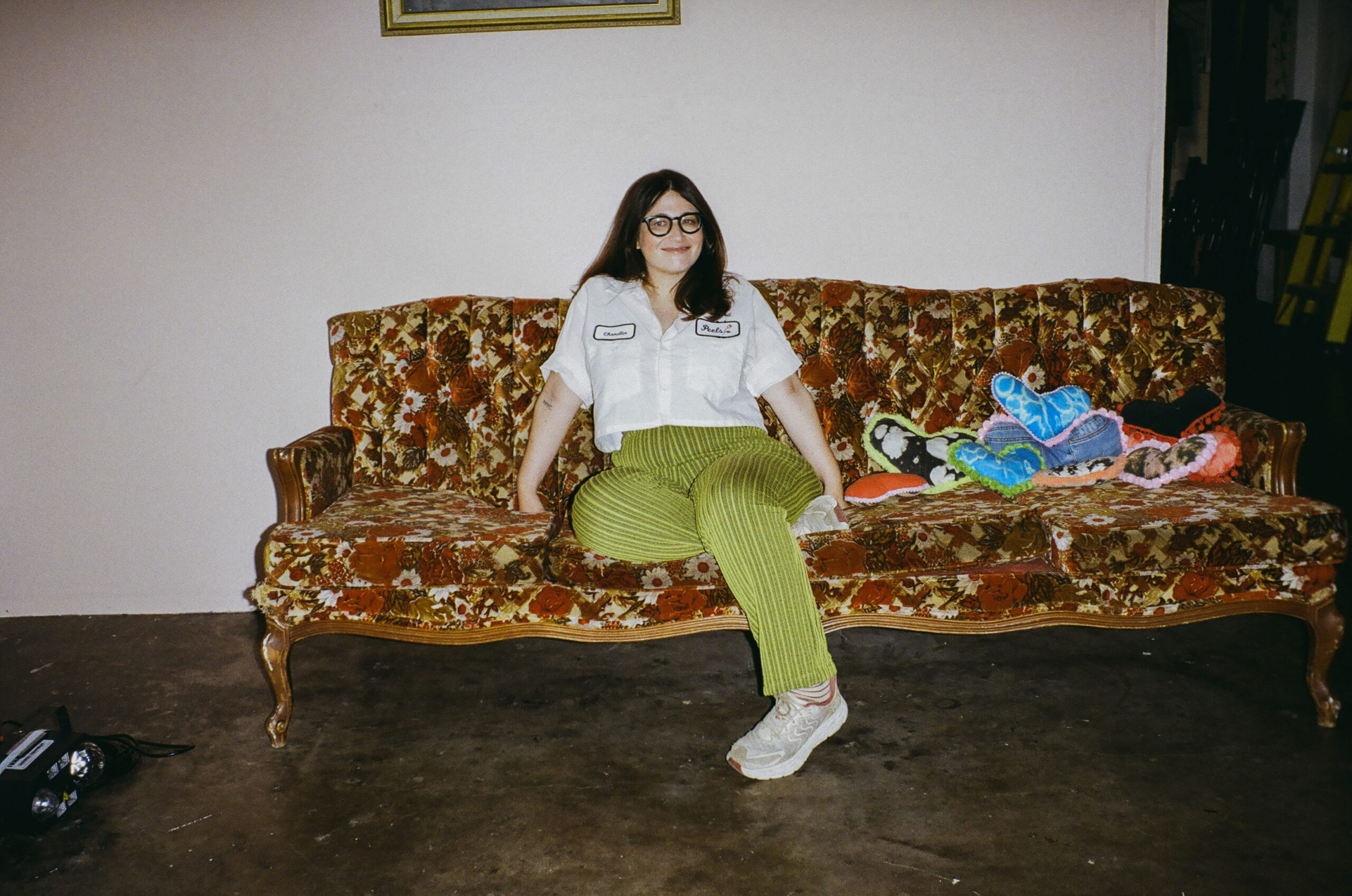There’s a scene in Mile End Kicks that almost any woman can relate to. A semicircle of plaid-shirted, bearded bros has gathered. They’re talking about a new album, or movie, or last night’s concert, all offering what they think are the sharpest critiques and edgiest opinions. And on the outside of that semicircle is you. You try to chime in, share your own perspective—one that you know is smart and original and valid— but you’re shut out. Ignored. Deemed not worthy of a place in the semicircle.
For writer-director Chandler Levack, this scene in her film was the most difficult to shoot. “When I was shooting that, it really struck a chord in me. I was like, ‘Oh my god, this is a painful, horrible image’.”
The periphery of the semicircle is where our protagonist finds herself at the beginning of Mile End Kicks, Levack’s sophomore feature film that premiered at TIFF last week. The film follows Grace Pine, a 23-year-old music journalist determined to tackle her next project: writing a book about Alanis Morissette. She leaves Toronto, and her job at a male-dominated indie music publication, and sets off to Montreal. Stumbling through the city’s late-night loft parties, she meets two potential love interests who are both members of the same band…and becomes the band’s publicist.
Set against the backdrop of Montreal’s early-2010s indie arts scene, Mile End Kicks is a romantic comedy for the woman in her early 20s who is still figuring everything out—from setting boundaries with men to making the rent. As she changes cities, career paths, and relationships, viewers get front-row seats to Grace’s messy, chaotic road to self-discovery, where she finally finds her voice and asserts her needs in both love and life.
“This film was really trying to talk about women trying to unpack themselves from toxic masculinity. Needing the male gaze, hating the male gaze, thinking that you are impervious to it, but still being trapped by it,” Levack says. “It was surprising to me that it was hard to admit that about myself, too.”

Courtesy of TIFF
Before she was a filmmaker, Levack was a film and music critic for publications like The Globe and Mail, SPIN, and The Toronto Star. Despite building a career out of writing about others, she tells us that her work has always had a subtle autobiographical bent. “I’d be reviewing a CD or movie, but it would be about a breakup that I had, or longing for someone, or something that’s happening in my life,” Levack says. “Even through criticism, I was still kind of using it as a mode of artistic expression.”
Levack acknowledges that she’s far from the first person in the journalist-to-filmmaker pipeline. Some of her favourite filmmakers—Cameron Crowe, Nora Ephron, Billy Wilder—came before her. In many ways, she says, journalism prepared her for the film world— conducting interviews, writing detailed profile pieces, and always being on the lookout for a good quote. But all along, what she truly wanted was to make movies.
“I was really scared to admit for a really long time that I wanted to be a filmmaker and that I wanted to make my own art,” Levack says. “I kind of lost myself in writing articles about other people, because it was a safer place to operate in. Something adjacent to the thing that I wanted, but couldn’t admit.”
In addition to her long-held dream of making films, Levack had always wanted to write about her own experiences, particularly her time as a young female music journalist. About 10 years ago, Levack was cat-sitting for friends in Montreal while they were on their honeymoon. Suddenly, there was a window of time. A chance to finally create what she had always wanted.
“I was like, okay, for the first time in your life, just take this month and only write a screenplay,” Levack says. “Use it as an opportunity to write something that you’re excited about.” And from there, the decade-long journey to the premiere of Mile End Kicks began.

Photo by Jess Baumung, courtesy of Elevation Pictures
But before that story was brought to life, Levack made her feature film debut with I Like Movies, another coming-of-age story inspired by her own life, but told from the perspective of Lawrence, a 17-year-old cinephile. Levack previously told SheDoesTheCity that writing the character as a teenage boy allowed her some distance from the narrative, but this time around, she observed that directing a story from the POV of a woman in her twenties was “a little bit more visceral, in maybe a good way.”
Another difference she’s anticipating is how viewers might respond to Grace compared to the compassion they showed Lawrence. “The reception of the movie…it’ll be interesting. Unfortunately, sometimes people are way more harsh on female characters,” she says.
But even so, there are countless moments in the film that so many women will resonate with deeply—whether it’s the emotional whiplash of dating someone who won’t commit, or questionable behaviour from older male bosses. Levack shares that many women, young and old, have expressed how they feel seen by Grace’s experiences in the film.
“I’ve had a lot of Gen Z women come up to me and be like, ‘Oh my God, that’s my life’. And in some ways, it really breaks my heart, because I’m like, ‘Oh my god, this is still happening?’”
Even so, as Levack reflects on the 10 years since writing the script, to now having it premiere at TIFF, she’s hopeful that her film can provide some of the solace she found in the seminal works of her youth.
“When I was much younger, it was shows like Girls and movies like Frances Ha that could really help me feel less alone and understood,” Levack says. “The movie is taking inspiration from those things. It would be great if it can be something that people relate to.”
Mile End Kicks premiered at the 2025 Toronto International Film Festival—stay tuned for more information on the film’s theatrical release.



 Follow Us On Instagram
Follow Us On Instagram
